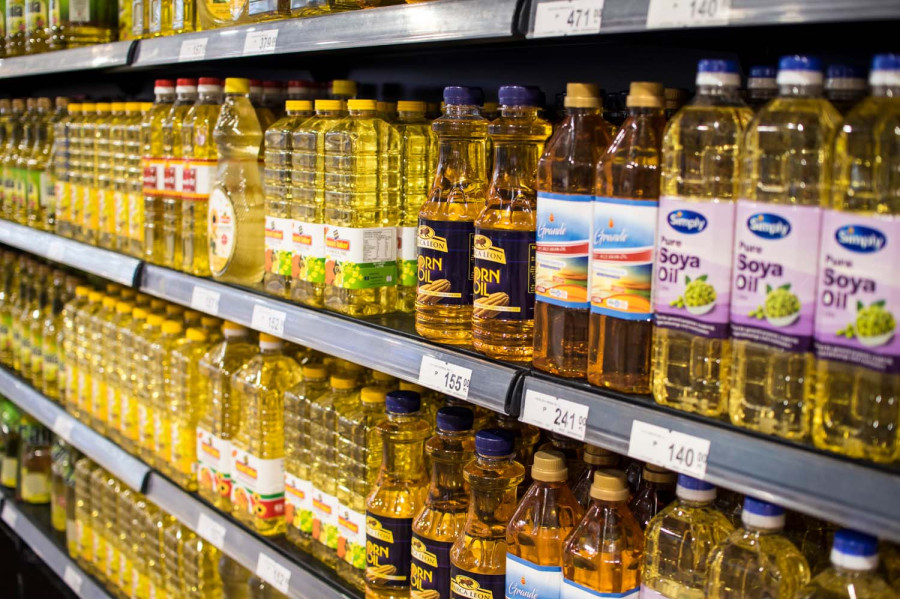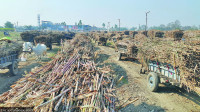Money
Indian oil lobby pushes for curbs on edible oil imports from Nepal
Solvent Extractors’ Association writes to Indian PM to close tariff loopholes, warns of revenue loss and market disruptions.
Krishana Prasain
The Solvent Extractors’ Association of India (SEA) has requested its government to regulate the inflow of edible oil from Nepal and other Saarc countries, claiming that these imports have been flouting rules of origin, bypassing trade regulations, and severely impacting India's domestic refiners, farmers, and government revenue.
The Post recently had an article on Nepal’s soyabean oil exports to India, which saw a staggering 45-fold increase in the first half of the current fiscal year, despite the country producing very little soyabean.
Experts attribute this surge to traders exploiting tariff loopholes in India, a recurring issue in Nepal’s trade.
SEA, a nationwide body representing Indian solvent extraction industry and the premier vegetable oil association there, has submitted a letter to Indian Prime Minister Narendra Modi and other senior cabinet ministers arguing that the import of edible oils at zero duty under the South Asian Free Trade Area (Safta) agreement harms India’s interests.
Indian media reports stated that on February 6, SEA wrote a letter: “We would like to draw your kind attention to the massive influx of refined soyabean oil and palm oil once again from Nepal to India, flouting rules of origin. This is seriously hurting domestic refiners and farmers and causing revenue loss to the government.”
The letter further stated that importing edible oil at zero duty from Nepal under the Safta agreement is disrupting markets not only in northern and eastern parts of India but also in southern and central India.
SEA President Sanjeev Asthana emphasised this concern in the communication.
According to SEA, the duty advantage under Safta has led to an estimated monthly inflow of 50,000 to 60,000 tonnes of refined oil from Nepal to India.
The association urged the government to impose a minimum import price for edible oils imported from Safta countries, ensuring that it is not lower than the price of domestically produced oil extracted from oilseeds as per India’s minimum support price.
The letter stressed the need for strict adherence to country-of-origin rules and value addition criteria, ensuring a clear price difference between imports from Safta countries and re-exports to India.
It also recommended modifying the Safta agreement to link duty-free imports to domestic demand and prevent India from becoming a dumping ground for these products.
SEA proposed routing imports through public-sector undertakings, such as the National Agricultural Cooperative Marketing Federation of India, to better manage and regulate trade flows from Nepal.
The association further suggested setting import quotas for refined oils from Nepal.
Nepal’s soyabean oil exports to India saw a staggering 45-fold increase in the first half of the current fiscal year, despite the country producing very little soyabean.
In September last year, India raised the basic import tax on crude and refined edible oils by 20 percent to support local farmers struggling with declining oilseed prices. Since then, soybean oil exports from Nepal have soared.
Trade expert Rabi Shankar Sainju pointed out that the value addition on exported soybean oil is often below 15 percent.
“Traders import processed liquid soybean oil in containers, package it in small packets, and re-export it to India, often manipulating documentation without engaging local labour,” said Sainju. “Nepal’s trade regulations require at least 30 percent value addition for exports to India, but this standard is reportedly not being met.”
Sainju, a former joint secretary at the Ministry of Supplies, criticised the government for its silence on this issue, as soyabean oil exports artificially inflate Nepal’s export figures.
He argued that this trade neither boosts investment in manufacturing nor significantly contributes to government revenue or the economy. Indian private-sector stakeholders have previously raised this concern, especially after edible oil exports from Nepal surged.
According to Nepal’s Department of Customs, soybean oil exports reached Rs18.91 billion in the first six months of the fiscal year, a sharp increase from Rs415.19 million in the same period last year. Meanwhile, Nepal’s crude soybean oil imports more than doubled to Rs24.37 billion.
The country imported 169,953 tonnes of crude soybean oil and exported 90,983 tonnes of processed soyabean oil to India. It sourced crude oil from Argentina, Benin, Brazil, Paraguay, Thailand, Togo, and Ukraine before refining it domestically for export.
Despite this booming trade, Nepal’s domestic raw soyabean production remains minimal at just 31,567 tonnes annually, insufficient to meet local demand. The trend of exporting large volumes of edible oils to India began in 2018-19.
That year, Nepal imported crude soyabean oil worth Rs13.43 billion and exported Rs2.34 billion of processed oil. In 2019-20, imports rose to Rs18.72 billion, with exports reaching Rs12.69 billion. This pattern peaked in 2021-22 when imports hit Rs56.18 billion and exports Rs48.12 billion.
The Indian Embassy in Kathmandu had previously raised concerns about tariff evasion through rerouted exports, prompting India to adjust its tariff policies in late 2021.
Under Safta and the India-Nepal Trade Treaty, Nepali exports to India enjoy zero-duty benefits. In contrast, non-South Asian countries face a 45 percent tariff on soybean oil exports to India. This significant price gap has incentivised traders to reroute edible oils through Nepal for duty-free access to the Indian market.
Nepali traders continue to profit from these tariff differentials, even as experts and policymakers question the long-term sustainability of this trade practice.
Nara Bahadur Thapa, former executive director of the Nepal Rastra Bank, said that while arbitrage-driven trade boosts revenue, it is neither sustainable nor beneficial for Nepal’s long-term economic stability.
He warned that using foreign currency reserves to facilitate such trade does little to promote economic growth or job creation.




 22.9°C Kathmandu
22.9°C Kathmandu













